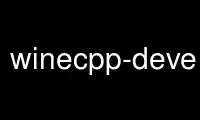
This is the command winecpp-development that can be run in the OnWorks free hosting provider using one of our multiple free online workstations such as Ubuntu Online, Fedora Online, Windows online emulator or MAC OS online emulator
PROGRAM:
NAME
winegcc - Wine C and C++ MinGW Compatible Compiler
SYNOPSIS
winegcc [options] infile...
DESCRIPTION
winegcc is a gcc wrapper which tries to provide a MinGW compatible compiler under Linux.
This is most useful to Win32 developers who can simply take their MinGW code from Windows,
and recompile it without modifications under Winelib on Linux. wineg++ accepts mostly the
same options as winegcc.
The goal of winegcc is to be able to simply replace gcc/g++/windres with
winegcc/wineg++/wrc in a MinGW Makefile, and just recompile the application using Winelib
under Wine. While typically there are small adjustments that must be made to the
application source code and/or Makefile, it is quite easy to do them in a fashion that is
compatible between the MinGW and Wine environments.
This manual will document only the differences from gcc; please consult the gcc manual for
more information on those options.
OPTIONS
gcc options: All gcc options are supported, and are passed along to the backend compiler.
-Bprefix
This option specifies where to find the executables, libraries, include files, and
data files of the compiler itself. This is a standard gcc option that has been
extended to recognize a prefix ending with '/tools/winebuild', in which case
winegcc enters a special mode for building Wine itself. Developers should avoid
prefixes ending with the magic suffix, or if that is not possible, simply express
it differently, such as '/tools/winebuild/', to avoid the special behaviour.
-fno-short-wchar
Override the underlying type for wchar_t to be the default for the target, instead
of using short unsigned int, which is the default for Win32.
-mconsole
This option passes '--subsystem console' to winebuild, to build console
applications. It is the default.
-mno-cygwin
Use Wine implementation of MSVCRT, instead of linking against the host system libc.
This is necessary for the vast majority of Win32 applications, as they typically
depend on various features of MSVCRT. This switch is also used by the MinGW
compiler to link against MSVCRT on Windows, instead of linking against Cygwin libc.
Sharing the syntax with MinGW makes it very easy to write Makefiles that work under
Wine, MinGW+MSYS, or MinGW+Cygwin.
-municode
Set the default entry point of the application to be the Unicode wmain() instead of
the standard main().
-mwindows
This option adds -lgdi32, -lcomdlg32, and -lshell32 to the list of default
libraries, and passes '--subsystem windows' to winebuild to build graphical
applications.
-nodefaultlibs
Do not use the standard system libraries when linking. These include at a minimum
-lkernel32, -luser32, -ladvapi32, and any default libraries used by the backend
compiler. The -mwindows option augments the list of default libraries as described
above.
-nostartfiles
Do not add the winecrt0 library when linking.
-Wb,option
Pass an option to winebuild. If option contains commas, it is split into multiple
options at the commas.
ENVIRONMENT
WINEBUILD
Specifies the path and name of the winebuild binary that will be launched
automatically by winegcc. If not set, winegcc will look for a file named winebuild
in the path.
DEFINES
winegcc defines __WINE__, for code that needs to know when it is being compiled under
Wine. It also defines WIN32, _WIN32, __WIN32, __WIN32__, __WINNT, and __WINNT__ for
compatibility with MinGW.
Use winecpp-development online using onworks.net services
